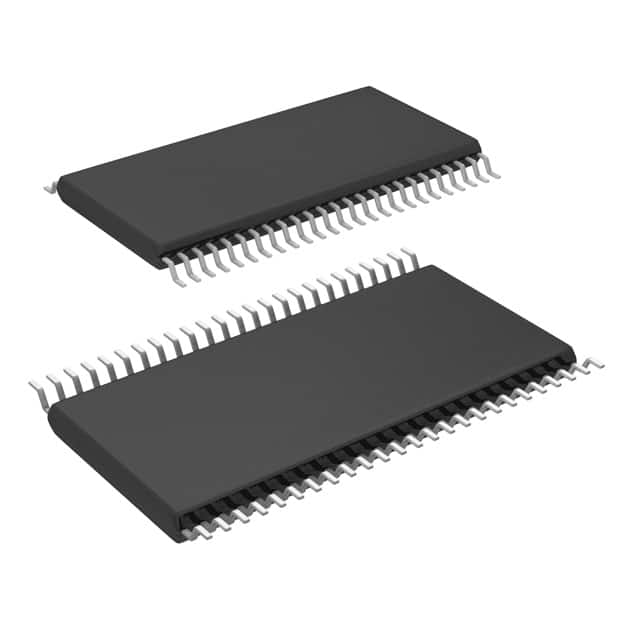74LVTH16245ADGGRE4
Basic Information Overview
- Category: Integrated Circuit (IC)
- Use: Level Shifter and Bus Transceiver
- Characteristics: High-speed, low-power, bidirectional voltage level translation
- Package: TSSOP (Thin Shrink Small Outline Package)
- Essence: Translates signals between different voltage levels in electronic systems
- Packaging/Quantity: Tape and Reel, 2500 pieces per reel
Specifications
- Supply Voltage Range: 2.7V to 3.6V
- Input Voltage Range: 0V to VCC
- Output Voltage Range: 0V to VCC
- Maximum Operating Frequency: 80 MHz
- Number of Channels: 16
- Logic Family: LVTH
Detailed Pin Configuration
The 74LVTH16245ADGGRE4 has a total of 48 pins, arranged as follows:
+---------------------+
OE1 --|1 48|-- VCC
GND1 --|2 47|-- A1
A2 --|3 46|-- B1
B2 --|4 45|-- A3
A4 --|5 44|-- B3
B4 --|6 43|-- A5
A6 --|7 42|-- B5
B6 --|8 41|-- A7
A8 --|9 40|-- B7
B8 --|10 39|-- A9
A10 --|11 38|-- B9
B10 --|12 37|-- A11
A12 --|13 36|-- B11
B12 --|14 35|-- A13
A14 --|15 34|-- B13
B14 --|16 33|-- A15
A16 --|17 32|-- B15
B16 --|18 31|-- OE2
GND2 --|19 30|-- B16
VCC2 --|20 29|-- A16
+---------------------+
Functional Features
- Bidirectional voltage level translation between two voltage domains
- High-speed operation allows for efficient data transfer
- Low-power consumption for energy-efficient designs
- 3-state outputs provide flexibility in bus systems
Advantages and Disadvantages
Advantages: - Wide supply voltage range allows compatibility with various systems - High-speed operation enables fast data transmission - Low-power consumption helps conserve energy - 3-state outputs allow for easy bus sharing
Disadvantages: - Limited maximum operating frequency compared to some other ICs - Requires careful consideration of voltage levels to avoid signal distortion
Working Principles
The 74LVTH16245ADGGRE4 is a bidirectional level shifter and bus transceiver. It translates signals between two voltage domains, allowing communication between devices operating at different voltage levels. The IC uses a combination of voltage level shifting circuitry and 3-state output buffers to achieve this functionality. When the enable (OE) pin is active, the IC actively translates signals bidirectionally. When the OE pin is inactive, the IC enters a high-impedance state, allowing other devices to drive the bus.
Detailed Application Field Plans
The 74LVTH16245ADGGRE4 is commonly used in various applications where voltage level translation is required. Some typical application fields include: - Communication systems - Data acquisition systems - Industrial automation - Automotive electronics - Consumer electronics
Detailed and Complete Alternative Models
- SN74LVC245A: Similar bidirectional level shifter with 3-state outputs, operates at a lower voltage range (1.65V to 5.5V).
- MC74LVX245: Another bidirectional level shifter with 3-state outputs, operates at a higher voltage range (2.0V to 6.0V).
- 74HCT245: Non-inverting octal bus transceiver, operates at a wider voltage range (4.5V to 5.5V).
These alternative models offer similar functionality but may have different specifications and pin configurations. It is important to select the appropriate model based on specific requirements and system constraints.
Word count: 511 words
Lista 10 Vanliga frågor och svar relaterade till tillämpningen av 74LVTH16245ADGGRE4 i tekniska lösningar
Sure! Here are 10 common questions and answers related to the application of 74LVTH16245ADGGRE4 in technical solutions:
Q: What is the function of the 74LVTH16245ADGGRE4? A: The 74LVTH16245ADGGRE4 is a 16-bit bus transceiver with 3-state outputs, used for bidirectional data transfer between two buses.
Q: What is the voltage range supported by the 74LVTH16245ADGGRE4? A: The 74LVTH16245ADGGRE4 supports a wide voltage range from 1.65V to 5.5V.
Q: Can the 74LVTH16245ADGGRE4 handle high-speed data transfers? A: Yes, the 74LVTH16245ADGGRE4 is designed for high-speed operation and can support data rates up to 400 Mbps.
Q: How many channels does the 74LVTH16245ADGGRE4 have? A: The 74LVTH16245ADGGRE4 has 16 bidirectional channels, allowing for simultaneous data transfer on each channel.
Q: Is the 74LVTH16245ADGGRE4 compatible with other logic families? A: Yes, the 74LVTH16245ADGGRE4 is designed to be compatible with both TTL and CMOS logic families.
Q: Can the 74LVTH16245ADGGRE4 handle level shifting between different voltage domains? A: Yes, the 74LVTH16245ADGGRE4 can be used for level shifting between different voltage domains, making it useful in mixed-voltage systems.
Q: Does the 74LVTH16245ADGGRE4 have built-in protection features? A: Yes, the 74LVTH16245ADGGRE4 has built-in ESD protection to safeguard against electrostatic discharge.
Q: What is the power supply voltage required for the 74LVTH16245ADGGRE4? A: The 74LVTH16245ADGGRE4 requires a power supply voltage of 2.7V to 3.6V.
Q: Can the 74LVTH16245ADGGRE4 be used in both commercial and industrial applications? A: Yes, the 74LVTH16245ADGGRE4 is suitable for use in both commercial and industrial applications due to its wide operating temperature range.
Q: Are there any specific layout considerations for using the 74LVTH16245ADGGRE4? A: Yes, it is recommended to follow the manufacturer's guidelines for proper PCB layout, including minimizing trace lengths and providing adequate decoupling capacitors.
Please note that these answers are general and may vary depending on the specific application and requirements.


